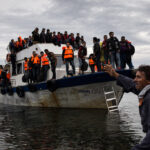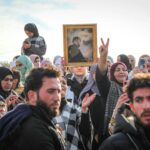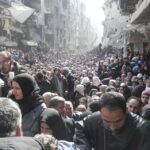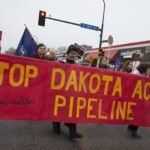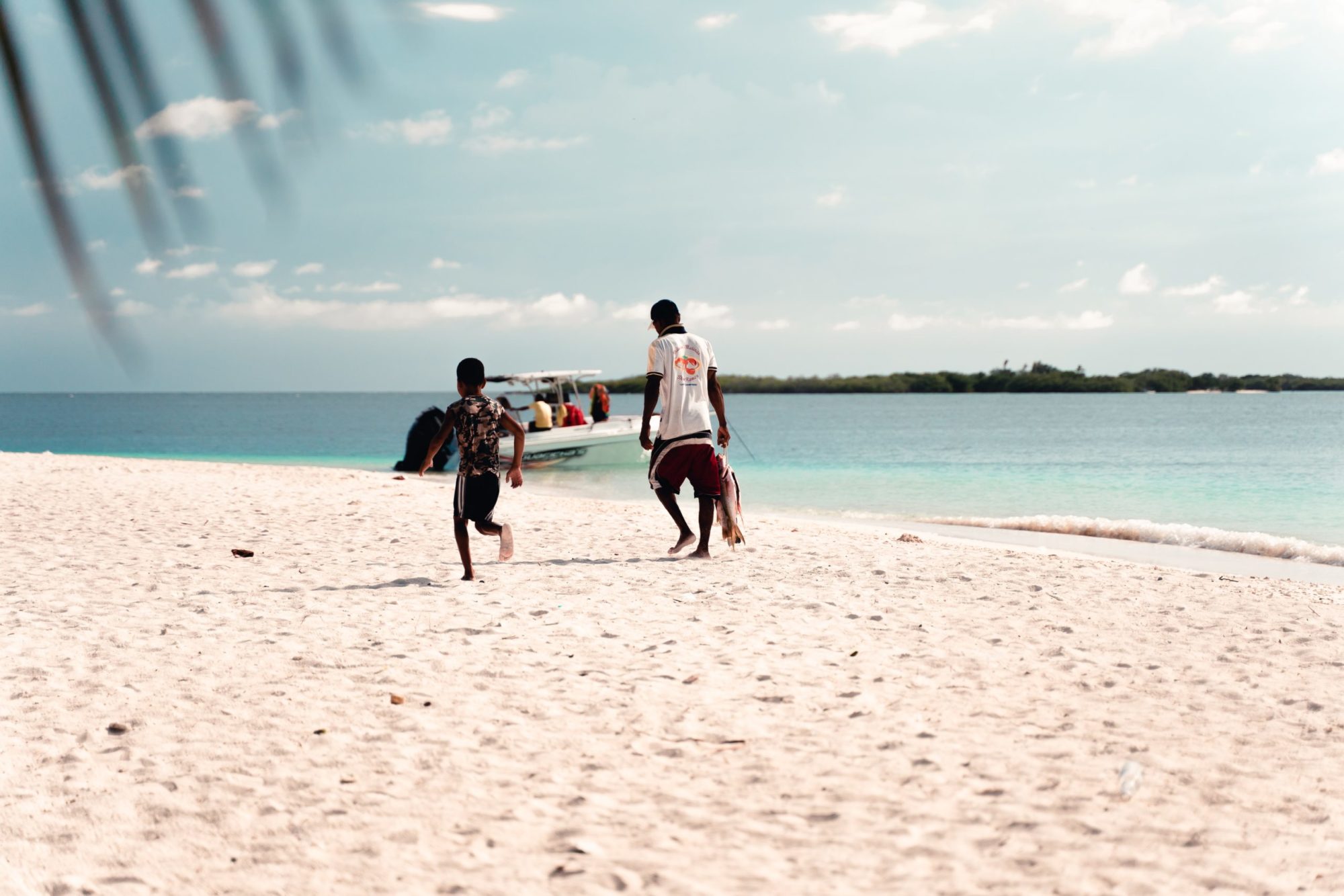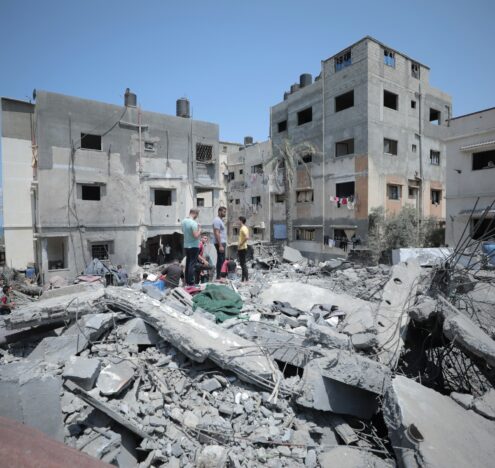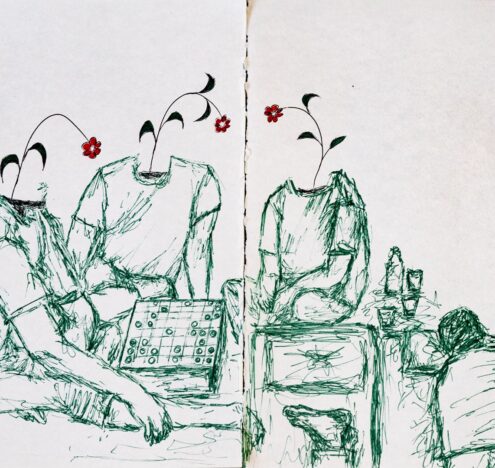It has been exactly two years since the attempt to oust Venezuelan president Nicolas Maduro failed. Since Maduro declared himself the winner of the 2018 election — a result that was not accepted by the vast majority of Western democracies — pressure from the international community, especially the United States, has increased. A comprehensive sanctions program led to a significant decrease in oil revenues. In the countryside of Venezuela, large areas have been occupied by Colombian terrorist groups, filling a vacuum created by the retreat of the Venezuelan military and the cessation of government activity. Almost one-fifth of Venezuela’s population, over 5.5 million people, has fled the country to either other Latin American countries or the United States, creating the largest migration and refugee crisis in the Americas today.
What is happening in Venezuela, the country with the largest oil reserves in the world? Venezuela’s decline is the result of a combination of factors that include at least three factors. First, a failed economic program driven by artificial currency exchange rates that also created the basis for massive exchange rate fraud. Second, strict price controls that reduced production and imports of basic goods and set the basis for the descent into poverty of large parts of the Venezuelan population. Finally, comprehensive sanctions against Venezuela’s oil sector, which are undermined by countries like China, Russia, Iran, and Turkey.
Those familiar with the situation in Venezuela describe the country as a corrupt mafia state that institutionalized money laundering from the top that is benefitting mainly those who are keeping Maduro in power. The international community is divided over the creation of a unified message of change. The EU, for example, no longer considers Juan Guaido the interim president since he lost his position as head of parliament in December 2020, following parliamentary elections — which the EU did not recognize. Instead, European states largely consider Guaido as privileged interloper.
Into this current time of turmoil, the Financial Action Task Force (FATF), the intergovernmental body that combats money laundering and terrorist financing, is planning to evaluate Venezuela with an on-site visit scheduled for November 2021. The FATF’s evaluation will have serious consequences for Venezuela’s economic and political future, especially if it ends up on one of the FATF’s lists.
HOW THE FATF EVALUATES COUNTRIES
The FATF is the global anti-money laundering (AML) and anti-terrorist financing watchdog. Its objective is to set international standards and promote effective implementation of legal, regulatory, and operational measures designed to combat money laundering, terrorist financing, and other related threats to the international financial system. The FATF has created a rule book with 40 recommendations that should be followed by its member states and by the member states of other FATF-style regional bodies.
The FATF has 39 members (37 countries and two regional organizations) that monitor the implementation of its recommendations. It also reviews money laundering and terrorist financing techniques and countermeasures in other countries through mutual evaluation reports (MERs). These assessments are carried out by a regional FATF body. In the case of Venezuela, this is the duty of the Caribbean Financial Action Task Force (CFATF). A MER largely includes a technical assessment, in which a country is graded on five possible outcomes: Compliant, largely compliant, partially compliant, noncompliant, and not applicable. It also includes an effectiveness assessment, which is the central component of an evaluation today. Here, a country must demonstrate that it has an effective framework in place to protect its financial system from abuse and that its measures really matter and are just not meaningless laws and regulations. The assessment looks at 11 key goals that should be met. For example, if a country fails to investigate and prosecute money laundering offenses, then it fails in goal number 7 of the effectiveness assessment.
Critics of US sanctions often state that the humanitarian crisis is the result of US policy. This is not true. It is important to point out that the economic and humanitarian crisis in Venezuela is a consequence of mismanagement by the Maduro regime prior to 2017.
Venezuela’s last MER by the CFATF took place in 2009, and various shortcomings were identified. Since then, eight follow-up reports on the progress of the country have been issued. The last was published in 2014 and found Venezuela noncompliant or partially compliant in 10 of the 16 core FATF recommendations, and overall noncompliant and partially compliant on a staggering 31 of the 40 FATF recommendations. Since 2014, no other follow-up report has been sent, and the CFATF website gives no information on any kind of activity during the last seven years, during which the situation in Venezuela has been steadily deteriorating. According to the FATF website, the next evaluation will be in November 2021, when a possible on-site visit is planned.
The FATF cannot impose penalties or fines, nor does it have any legal power to punish a country for noncompliance. It has, however, the ability to call out countries with significant deficiencies in local AML policies and laws, leading the media to cover its activities. FATF’s influence, therefore, should not be underestimated, and will most likely create a ripple effect within the news coverage that will negatively impact Venezuela.
THE FATF’S LISTS
While AMLs and enforcement actions vary per country, the FATF has created a useful classification that provides visibility into the effectiveness of AMLs and puts pressure on countries that possess insufficient laws and processes. The FATF places these jurisdictions on either a grey list or a blacklist. In 2019, for example, FATF placed Iceland on the grey list after the country did not meet the FATF’s requirements. Iceland was quick in addressing its shortcomings and a year later FATF removed it from the grey list. An FATF warning, therefore, can be seen as an alert to other countries and financial institutions to treat transactions and accounts largely in the same careful way they are treated by the majority of US financial institutions today.
The FATF grey list names countries with inadequate AML resources and places them under increased monitoring. These countries in return have agreed to improve the shortcomings in their AMLs. As of today, the following countries are part of the FATF grey list: Albania, Bahamas, Barbados, Botswana, Burkina Faso, Cambodia, Cayman Islands, Ghana, Jamaica, Mauritius, Mongolia, Myanmar, Nicaragua, Pakistan, Panama, Senegal, Syria, Uganda, Yemen, and Zimbabwe. It is actually quite ironic to see Panama on the grey list and not Venezuela. Panama is, to a large extent, on the receiving end of Venezuelan asset outflow. While the country took measures to technically comply with FATF recommendations, it was the effectiveness assessment where Panama largely failed. Panama is the home of a large Venezuelan enclave and was in the headlines because of a leak at the local law firm Mossack & Fonseca. The so-called Panama Papers listed a network of over 200,000 shell companies and may have been a contributing factor in the evaluation.
The blacklist is for jurisdictions that represent a high risk and have “significant deficiencies in their regimes to counter money laundering, terrorist financing and financing of proliferation.” As of today, only two nations are on the FATF blacklist: Iran and North Korea, both of which fund terrorism and launder money. They are also noncooperative, which means there is no possibility for a regional body to enter into conversations about improving their AML laws.
The implications for being on either the grey list or the blacklist are manifold. Grey-listed countries might have more difficulty obtaining loans from the International Monetary Fund, the World Bank, and other multilateral institutions, or they may also face boycotts or economic sanctions from other countries. For example, Pakistan was added to the grey list in 2018, the consequence of which has been the loss of an estimated $38 billion according to TABADLAB, an Islamabad-based think tank. Nongovernmental organizations (NGOs) and other financial institutions simply avoided doing business with Pakistan due to the associated operational and reputational risks. The withdrawal of correspondent banking relationships prior to greylisting Pakistan likely contributed to this figure.
FACTORS THAT HAVE CAUSED VENEZUELA’S DECLINE
The situation in Venezuela today is a direct result of four interconnected forces and factors:
- The failed economic policies that sent large parts of the Venezuelan population into poverty and created a humanitarian crisis,
- The illegitimacy of the Maduro regime and the resulting sanctions pressure,
- The lack of government resources and the consequential dissolvement of governing authority, particularly in rural areas, and
- The regional disintegration and the emerging presence of terrorist networks in large parts of the country concentrated at the Brazilian and Colombian borders.
Maduro was re-elected president under suspicious circumstances in 2018. All Western democracies and most Latin American countries did not recognize his regime, but a few countries did, including China, Russia, Cuba, North Korea, Iran, and Turkey. These countries are also the main trading partners and beneficiaries of Venezuela’s asset outflow, mainly oil and precious metals, as Venezuela does not have anything else to export.
The sanctions policies of Western democracies tightened significantly after Maduro’s 2018 power grab. The various US sanctions against Venezuela have proven to be particularly effective. We can group US sanctions against Venezuela as follows: Sanctions related to terrorism and drug trafficking; targeted sanctions related to anti-democratic actions, human rights violations, and corruption; financial sanctions; and broader sectoral sanctions against the state-owned oil company. Part of the US sanctions policy also targeted entities that facilitate the sale of Venezuelan oil, which included shipping companies, individuals, and vessels.
Outside of the US sanctions regime, however, falls the provision of humanitarian aid, which has been delivered to Venezuela through the application of licenses. As of today, the US government has provided more than $1 billion in humanitarian assistance despite numerous attempts by the Maduro regime to target NGOs, which was confirmed in a statement by the Office of the UN High Commissioner for Human Rights from February of this year. Additionally, in January of this year, numerous humanitarian organizations suspended programs due to continuous harassment by the Venezuelan government.
Critics of US sanctions often state that the humanitarian crisis is the result of US policy. This is not true. It is important to point out that the economic and humanitarian crisis in Venezuela is a consequence of mismanagement by the Maduro regime prior to 2017. According to the Brookings Institution, there is plenty of evidence to prove this point. By 2016, for example, food imports to Venezuela had fallen by 71% from their peak in 2013. Child mortality, which is a good indicator of the quality of public health systems, grew by 44% between 2013 and 2016. Reuters reported in 2017 that the average weight loss per person in Venezuela has been 11 kilograms, while 90% of the country lives in poverty. The outflow of Venezuelan citizens is also not a result of the US sanctions policy but rather the continuation of a process that started over a decade ago. As noted previously, the six million Venezuelans who have left their country constitute the largest migration and refugee crisis in the Americas today.
SO… WHERE DOES ALL OF VENEZUELA’S MONEY GO?
To understand Venezuela’s current economic situation, it’s important to understand the country’s sources of income, which include proceeds from oil exports and gold reserves, the sale of narcotics, and tax revenue from households and businesses in municipal areas that the government still controls.
Oil revenues
In 2016, Venezuela produced over 2.2 million barrels of oil per day — that number dropped to under 500,000 in February of this year. Despite its sanctions, Venezuela is still able to sell oil via ship-to-ship transfers, the creation of shell companies, turned-off satellite signals on oil tankers, and a new technique that adds chemical components to the heavy crude with a corresponding name change of the end product.
The extraterritoriality of the US sanctions programs is making it more difficult for the Maduro regime to sell oil, as the US Department of Treasury has the ability to punish those maritime players that are aiding Maduro. The trading firm, Swissoil Trading, for example, sold over 11.3 million barrels, according to documents seen by Bloomberg. As a result, Swissoil Trading and its main executives have been added to the US sanctions list. This situation can be compared to the jewelry trade, where the prices for stolen merchandise are lower than for justly acquired merchandise. It has been established that China and, to a smaller extent, Iran have been the main buyers of Venezuelan oil after sanctions against the state-owned company Petróleos de Venezuela, S.A. (PdVSA) were issued. As long as these nations keep buying Venezuelan oil, they are providing a lifeline to the Maduro regime.
Sale of gold reserves
Venezuela possesses the largest gold deposits in the world and is using its gold deposits to generate revenue. The Venezuelan National Assembly has charged the Maduro regime with selling more than 73 tons of gold worth $3 billion to companies in Turkey and the United Arab Emirates (UAE). While Venezuelan reserves have dropped to 86 tons, their lowest in fifty years, the Maduro regime is provided with a continuous stream of income. This makes both Turkey and the UAE active collaborators.
Drug distribution proceeds
Venezuela also generates revenue through the distribution of large amounts of narcotics. Drug distribution is normally the job of private cartels and operating entities that work in the illicit economy and largely in the shadows of government oversight. The international community needs to note that the Maduro family and others at the top level of the Venezuelan government and military forces actively support and engage in the distribution of narcotics. Members of the Venezuelan military formed the Cártel de Los Soles, or “Cartel of the Suns,” named after the sun insignias worn by Venezuelan military personnel. This cartel is the main participant in drug trafficking operations. It has relationships mainly with FARC in Colombia, who transports cocaine to Venezuela for further distribution, and to a lesser extent with Hamas and Hezbollah.
Consider these facts: Maduro was charged by the US Department of Justice in March 2020 with drug trafficking, making him only the second head of state in the Americas, after Manuel Noriega, to be charged. (Noriega was subsequently removed.) A nephew and the adopted son of Venezuela’s first lady have been jailed for 18 years by a US court for drug trafficking. The private pilot of the first lady, Yazenky Lamas, who has been extradited to the United States from Colombia (where he was arrested in spectacular fashion), conducted over a hundred drug runs between Venezuela and the Caribbean. It is hard to believe that the first lady of Venezuela was not aware of these activities, given that many of them took place on military air bases and were also carried out via the presidential airport ramp. Lamas, like so many others who have been arrested, is cooperating with US authorities and has provided significant knowledge about the state of Venezuelan narco operations.
It is difficult to estimate the proceeds of drug sales, but it is fair to say that this income is one of the reasons why parts of the military are still supporting Maduro.
Domestic tax revenues
Traditionally, Venezuelan tax revenue as a percentage of GDP has been lower than that of other Latin American countries and is more like that of African nations. In 2020, Venezuela’s total tax collection reached only $462 million, according to the country’s tax agency SENIAT. By comparison, Belize, with a population of 390,353 in 2020, generated $621 million.
Tax revenue has been plummeting because the Venezuelan economic model established a wide array of price controls for the majority of consumer goods. This resulted in a reduction of imports and local production, as the incentive to import and produce basic goods and services has been significantly reduced. The effects of the current sanctions environment, however, is that the Maduro administration has completely abandoned price controls and moved toward the full liberalization of the Venezuelan economy. There are no more price controls, no generous subsidies that keep goods and services artificially cheap. If the sanctions regime has already achieved anything, it is the complete shift from a socialist economy to a free market economy. Today, the political and economic model of Venezuela can be described as some sort of military-supported dictatorship with a free (black) market that uses US dollars and Euros. As there are no funds from the government to support municipalities, many cities have started to collect hefty local taxes to support the provision of basic services. Municipal taxes are skyrocketing. Trash collection fees, for example, have jumped 187,000% (one hundred eighty-seven thousand times) according to the calculations by the Venezuelan Observatory of Finance.
VENEZUELA’S POWER VACUUMS
When municipalities are left to their own fates and the government reduces its governance, power vacuums are created that are filled by nongovernmental players. Every failed state that disintegrates goes through a similar pattern: Local administrations replace government structure, and lack of governing authority allows for new entrants to assume control. In Venezuela, these are Colombian terror networks that are now operating in large parts of the country. The New York Times reported in April 2021 that guerrilla fighters from Colombia now operate in more than half of Venezuela’s territory, according to various sources including the Colombian military, rights activists, security analysts, and dozens of interviews in the Venezuelan states where these fighters are present. It is foremost the ELN — the National Liberation Army, Latin America’s last remaining rebel group and an organization declared terrorist by the United States and EU — that brings stability to parts of the country. According to the New York Times article, the ELN provides some basic government services, such as the provision of drinking water and medical checkups. It also collects local taxes from small businesses, and in return, it now occupies important smuggling and drug trafficking routes. While the ELN has had a presence in Venezuela at least since the 1970s, it has expanded its power structures with the retreat of governing activities of the Maduro regime. Also, FARC dissidents are present in large parts of the country.
There are significant consequences when regimes crumble. What makes Venezuela different from other failed states is its consistent ability to generate large sums of cash for a relatively small group of people. This cash comes from the combination of drug distribution, illegal oil sales, and gold exports and provides enough revenue and incentive for the regime to still operate.
WHAT CAN THE INTERNATIONAL COMMUNITY DO?
Resolving the Venezuelan crisis will be extremely difficult. The international community is divided over how to proceed. Western democracies, with the United States at the forefront, are pushing for regime change, while Russia, China, and Turkey are the most consequential supporters of the regime, providing financial lifelines, and as such, contributing to the prolonged struggle in the country.
Various experts, including an expert at the International Center for Asset Recovery of the Basel Institute of Governance, estimate that over the last 20 years more than $300 billion have been embezzled and stolen from PdVSA, often through a complex currency control system. Recent high-profile cases include the arrest of Matthias Krull, who was the banker of a group of executives that funneled billions of dollars from PdVSA, using the artificial dollar exchange rate, through a network of shell companies. He was arrested in Miami in 2018 and is cooperating with authorities. Another case is that of the Luxembourg-based network of shell companies operated by Alejandro Betancourt López, a close ally of Francisco Convit, who is on the run from US authorities for stealing $1.2 billion from PdVSA. The highest profile case is the current extradition battle of Alex Saab, who helped launder hundreds of millions of dollars in corruption proceeds and was key in helping the Maduro regime sell gold and oil after Venezuela was sanctioned. Billions of dollars more have vanished, as documented in the FINCEN files, including the $4.8 billion of suspicious activity reported between 2009 and 2017.
With the magnitude of the current theft and asset outflow, calls are getting louder for the creation of mechanisms to repatriate the billions of dollars that have been stolen. The UN Convention against Corruption and the policy of the US government demand that the recovered proceeds of Venezuelan corruption should be returned to the people of Venezuela.
VENEZUELA SHOULD BE ON A FATF LIST
Transparency International ranks Venezuela as the fifth-most corrupt country in the world, behind only Somalia, South Sudan, Yemen, and Syria, all countries that are described as failed states. With the exception of maybe Syria, these countries do not possess the natural wealth of Venezuela and cannot damage or distort the financial system overall.
One of the main challenges in combating money laundering is the discrepancy of regional enforcement, mechanisms, laws, and standards. US banks, for example, are treating Venezuelan clients differently from Spanish mortgage banks that benefit from Venezuelan clients or Swiss private banks. Significant penalties in the US legal system exist if violations of AML laws occur that are quite different from the enforcement actions of other countries, for example Switzerland or Spain, two of the main recipients of funds from Venezuela in Europe.
The process to blacklist or grey-list Venezuela might be long and there is no guarantee that it will happen. But it would ensure that Venezuela would become a high-risk third country for the EU, and as a result, alert those financial institutions that have not implemented stronger risk controls when dealing with Venezuelan clients and assets. It is ultimately a stronger sanctions program of other Western economies like the EU and implemented by its financial institutions that would make it harder for illicit funds from Venezuela to find their way into the financial system, real estate assets and other vehicles. With a FATF blacklisting or grey-listing however, the regulatory framework would be enhanced by an important decision of the intergovernmental body.
It is an important step to raise awareness for treating Venezuelan originated funds for what they very likely are when they move around the world: funds from illicit sources and illicit activity.
Ingo Steinhaeuser advises financial institutions and corporations on third party risk related matters.



